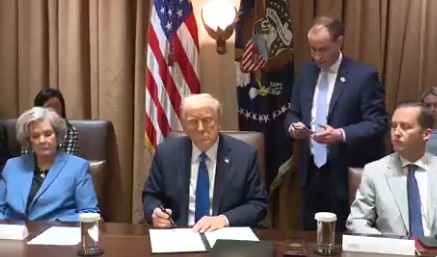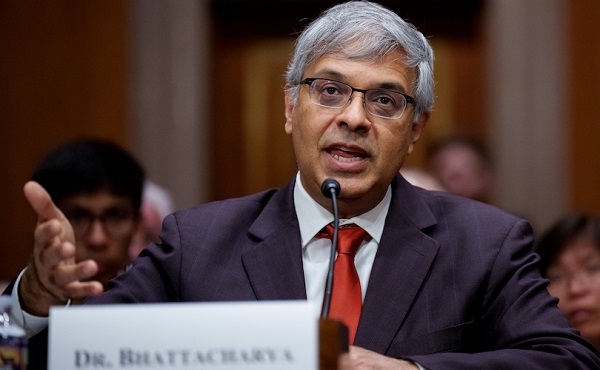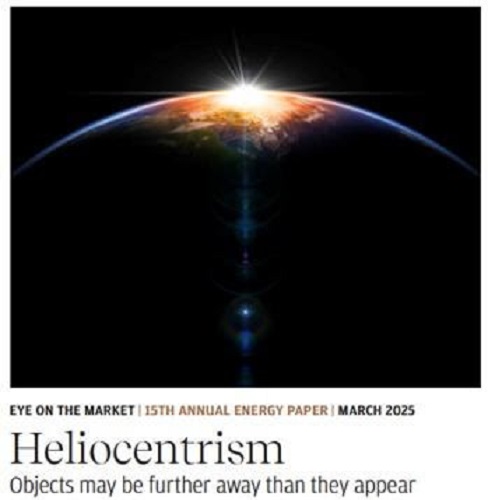International
Trump orders proof of citizenship to vote in federal elections

 MxM News
MxM News
Quick Hit:
President Donald Trump on Tuesday signed an executive order aimed at restoring confidence in America’s elections by enforcing voter ID, cracking down on non-citizen voting, and ensuring compliance with existing federal election laws.
Key Details:
-
The executive order criticizes the United States for falling behind other nations in securing its elections, noting that while India and Brazil use biometric voter ID systems, many U.S. states rely on self-attestation.
-
Trump ordered the Election Assistance Commission to update the national voter registration form to require “documentary proof of United States citizenship,” including passports or REAL ID-compliant documents.
-
The order also instructs the Department of Justice to crack down on states that count ballots received after Election Day, stating that counting late ballots is akin to letting someone “vote in person at a former voting precinct” days after polls close.
Diving Deeper:
On Tuesday, President Trump signed a far-reaching executive order titled Preserving and Protecting the Integrity of American Elections, aiming to overhaul how federal and state governments enforce longstanding election laws.
In the order’s opening section, Trump drew comparisons to foreign democracies, arguing that “the United States now fails to enforce basic and necessary election protections employed by modern, developed nations.” He cited examples including India and Brazil’s biometric-linked voter ID systems and Germany and Canada’s paper ballot requirements, adding that “many American elections now feature mass voting by mail,” often accepting ballots “without postmarks or those received well after Election Day.”
Trump’s directive enforces federal laws already on the books, such as 2 U.S.C. § 7 and 3 U.S.C. § 1, which establish a uniform national Election Day. Referencing a 2024 Fifth Circuit ruling, the order states that ballots must be both cast and received by Election Day. “This is like allowing persons who arrive 3 days after Election Day, perhaps after a winner has been declared, to vote in person… which would be absurd,” the order reads.
A central element of the order is the crackdown on non-citizen voting. It mandates that the national voter registration form include “documentary proof of United States citizenship,” such as a passport, a REAL ID-compliant card, or a military ID indicating citizenship. The order also requires that state and local officials document the specific proof of citizenship used during registration.
To assist states in cleaning up voter rolls, Trump directed the Department of Homeland Security to provide access to immigration databases and mandated that the Social Security Administration share death and identity data. The Attorney General is instructed to “prioritize enforcement” of statutes that prohibit non-citizens from registering or voting and to coordinate with state officials to prosecute violations.
The order also targets election infrastructure and voting machines, requiring that all voting systems include “a voter-verifiable paper record” and banning systems that use barcodes or QR codes to contain vote data, except for accessibility needs. The Election Assistance Commission is instructed to decertify equipment that fails to meet new integrity standards within 180 days.
The executive order further aims to eliminate foreign interference by enforcing 52 U.S.C. § 30121, which bans foreign contributions to federal, state, or local elections. Trump highlighted the abuse of ballot initiative spending loopholes and committed federal enforcement resources to curtail this influence, declaring that “foreign nationals and non-governmental organizations have taken advantage of loopholes… undermining the franchise.”
Through information-sharing agreements, increased prosecution, and withholding of federal funds to uncooperative states, the order seeks to hold jurisdictions accountable for maintaining accurate voter rolls and enforcing citizenship requirements.
“In honest elections,” the order concludes, “voting methods must produce a voter-verifiable paper record… to protect against fraud or mistake.”
Automotive
Trump warns U.S. automakers: Do not raise prices in response to tariffs

 MxM News
MxM News
Quick Hit:
Former President Donald Trump warned automakers not to raise car prices in response to newly imposed tariffs, arguing that the move would ultimately benefit the industry by strengthening American manufacturing. However, automakers are signaling that price increases may be unavoidable.
Key Details:
- Trump told auto executives on a recent call that his administration would look unfavorably on price hikes due to tariffs.
- A 25% tariff on imported vehicles and parts is set to take effect on April 2, likely driving up costs for U.S. automakers.
- Industry analysts predict vehicle prices could rise 11% to 12% in response, despite Trump’s insistence that tariffs will benefit American manufacturing.
Diving Deeper:
In a conference call with leading automakers earlier this month, former President Donald Trump issued a stern warning: do not use his new tariffs as an excuse to raise car prices. While Trump presented the tariffs as a boon for American manufacturing, industry leaders remain unconvinced, arguing that the financial burden will inevitably lead to higher costs for consumers.
Trump’s administration is pressing ahead with a 25% tariff on all imported vehicles and parts, set to take effect on April 2. The move is aimed at reshaping trade dynamics in the auto industry, encouraging domestic manufacturing, and reversing what Trump calls the damaging effects of President Joe Biden’s electric vehicle mandates. Despite this, automakers say that rising costs on foreign parts—which many depend on—will leave them little choice but to pass expenses onto consumers.
“You’re going to see prices going down, but going to go down specifically because they’re going to buy what we’re doing, incentivizing companies to—and even countries—companies to come into America,” Trump stated at a recent event, reinforcing his stance that the tariffs will ultimately lower costs in the long run.
However, industry insiders are pushing back, warning that a rapid shift to domestic production is unrealistic. “Tariffs, at any level, cannot be offset or absorbed,” said Ray Scott, CEO of Lear, a major automotive parts supplier. His concern reflects broader anxieties within the industry, as automakers calculate the financial strain of the tariffs. Analysts at Morgan Stanley estimate that vehicle prices could increase between 11% and 12% in the coming months as the new tariffs take effect.
Automakers have been bracing for the fallout. Detroit’s major manufacturers and industry suppliers have voiced their concerns, emphasizing that transitioning supply chains and manufacturing operations back to the U.S. will take years. Meanwhile, auto retailers have stocked up on inventory, temporarily shielding consumers from price hikes. But once that supply runs low—likely by May—the full impact of the tariffs could hit.
Within the Trump administration, inflation remains a pressing concern, though Trump himself rarely discusses it publicly. His economic team is aware of the potential for tariffs to drive up costs, yet the administration’s stance remains firm: automakers must adapt without raising prices. It remains unclear, however, what actions Trump might take should automakers defy his warning.
The auto industry isn’t alone in its concerns. Executives across multiple sectors, from oil and gas to food manufacturing, have been lobbying against major tariffs, arguing that they will inevitably result in higher prices for American consumers. While Trump has largely dismissed these warnings, some analysts suggest that public dissatisfaction with rising costs played a key role in shaping the outcome of the 2024 election.
With the tariffs set to take effect in just weeks, automakers are left grappling with a difficult reality: absorb billions in new costs or risk the ire of a White House determined to remake America’s trade policies.
Business
Labor Department cancels “America Last” spending spree spanning five continents

 MxM News
MxM News
Quick Hit:
The U.S. Department of Labor has scrapped nearly $600 million in foreign aid grants, including $10 million aimed at promoting “gender equity in the Mexican workplace.”
Key Details:
-
Labor Secretary Lori Chavez-DeRemer and Deputy Secretary Keith Sonderling were credited with delivering $237 million in savings through the latest round of canceled programs.
-
Among the defunded initiatives: $12.2 million for “worker empowerment” efforts in South America, $6.25 million to improve labor rights in Central American agriculture, and $5 million to promote women’s workplace participation in West Africa.
-
The Department of Government Efficiency described the cuts as necessary to realign U.S. labor policy with national interests and applauded the elimination of all 69 international grants managed by the Bureau of International Labor Affairs.
Diving Deeper:
The U.S. Department of Labor on Wednesday canceled $577 million in foreign aid grants, including a controversial $10 million program aimed at promoting “gender equity in the Mexican workplace,” according to documents obtained by The Washington Post. The sweeping decision to terminate all 69 active international labor grants comes as part of a larger restructuring effort led by John Clark, a senior DOL official appointed during the Trump administration.
Clark directed the department’s Bureau of International Labor Affairs (ILAB) to shut down its entire grant portfolio, citing a “lack of alignment with agency priorities and national interest.” The memo explaining the cancellations was first reported by The Washington Post and highlights a broader shift in federal labor policy toward domestic-focused initiatives.
Among the eliminated grants were high-dollar projects that had drawn criticism from watchdog groups for years. These included $12.2 million designated for “worker empowerment in South America,” $6.25 million targeting labor conditions in Honduras, Guatemala, and El Salvador, and $5 million to elevate women’s workplace participation in West Africa. Other defunded programs involved $4.3 million to support foreign migrant workers in Malaysia, $3 million to improve social protections for internal migrants in Bangladesh, and $3 million to promote “safe and inclusive work environments” in Lesotho.
The Department of Government Efficiency, also involved in the review, labeled the grants as “America Last” initiatives, and pointed to the lack of measurable outcomes and limited benefits to American workers. The agency commended the leadership of Labor Secretary Lori Chavez-DeRemer and Deputy Secretary Keith Sonderling for securing $237 million in savings during this round alone.
The cuts mark the second major cost-saving move under Chavez-DeRemer’s leadership in as many weeks. Just days earlier, she canceled an additional $33 million in funding, including a $1.5 million grant focused on increasing transparency in Uzbekistan’s cotton sector. Chavez-DeRemer, a former Republican congresswoman from Oregon, was confirmed as Labor Secretary on March 11th by a bipartisan Senate vote of 67-32.
-

 Alberta2 days ago
Alberta2 days agoAlberta Institute urging Premier Smith to follow Saskatchewan and drop Industrial Carbon Tax
-

 Health2 days ago
Health2 days agoHow the once-blacklisted Dr. Jay Bhattacharya could help save healthcare
-

 Alberta2 days ago
Alberta2 days agoAlbertans have contributed $53.6 billion to the retirement of Canadians in other provinces
-

 Alberta16 hours ago
Alberta16 hours agoProvince announces plans for nine new ‘urgent care centres’ – redirecting 200,000 hospital visits
-

 Energy2 days ago
Energy2 days agoPoll: Majority says energy independence more important than fighting climate change
-

 Business1 day ago
Business1 day agoFeds Spent Roughly $1 Billion To Conduct Survey That Could’ve Been Done For $10,000, Musk Says
-

 Addictions2 days ago
Addictions2 days agoShould fentanyl dealers face manslaughter charges for fatal overdoses?
-

 Health1 day ago
Health1 day agoRFK Jr. Drops Stunning Vaccine Announcement









